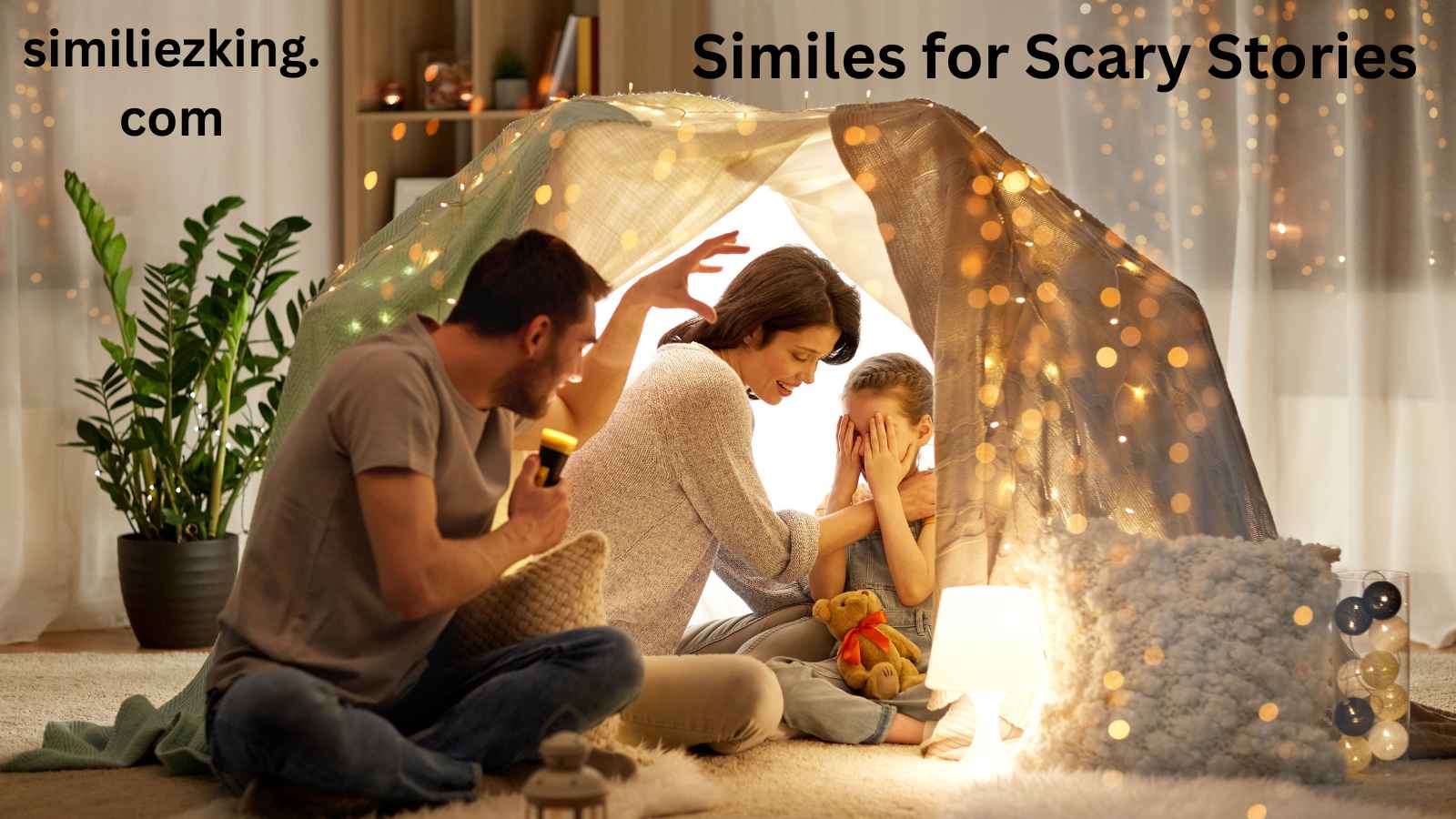Scary stories aren’t just about the monsters, the shadows, or the bumps in the night. They live and breathe through language—the way words crawl off the page and into the reader’s spine. One powerful way to do that is through similes: comparisons using “like” or “as” that bring fear to life.
Whether you’re a student crafting a spine-chilling short story, a fiction writer looking to intensify your scenes, or a teacher helping young writers grasp vivid language, this guide has you covered. We’ll walk through 15+ original, chilling similes, each with clear examples, emotional nuance, and suggestions on when and how to use them. We’ll also cover polite, professional, and casual alternatives to the phrase “similes for scary stories” to help you sound sharp, smart, or spooky depending on your tone.
1. Like a whisper in a tomb
Used to describe faint sounds that feel unnatural.
Example: Her voice was low, like a whisper in a tomb, barely louder than the beating of his heart.
2. Like eyes watching from a dark forest
Implies hidden danger or being followed.
Example: The silence was thick, like eyes watching from a dark forest, waiting for someone to slip.
3. Like breath on the back of your neck
Perfect for unseen or ghostly presences.
Example: He felt something pass, like breath on the back of his neck, though no one was there.
4. Like broken music from a haunted box
For creepy sounds or broken lullabies.
Example: The sound echoed, like broken music from a haunted box, each note more twisted than the last.
5. Like blood dripping in an empty room
Conveys eerie quiet with a sinister twist.
Example: The ticking clock was sharp, like blood dripping in an empty room, rhythmic and unnerving.
6. Like footsteps soaked in sorrow
Builds a ghostly, tragic atmosphere.
Example: She walked slowly, like footsteps soaked in sorrow, fading with every step.
7. Like laughter at a funeral
Creates unsettling contrast.
Example: The child giggled, like laughter at a funeral, a sound that didn’t belong there.
8. Like shadows growing teeth
Describes danger hiding in darkness.
Example: The corners of the room seemed to shift, like shadows growing teeth.
9. Like a scream buried under silence
Highlights internal panic or quiet dread.
Example: His heart pounded, like a scream buried under silence, aching to break free.
10. Like the cold kiss of the dead
For chilling sensations.
Example: The air touched his cheek, like the cold kiss of the dead.
11. Like secrets carved into bone
Suggests something ancient and terrifying.
Example: The writing was old, like secrets carved into bone, hidden for centuries.
12. Like time stopped to listen
Great for suspenseful pauses.
Example: She froze, like time stopped to listen, afraid of what came next.
13. Like dreams gone wrong
For surreal horror or hallucination scenes.
Example: The hallway twisted, like dreams gone wrong, with doors that led nowhere.
14. Like death whispering lullabies
Blends calmness with dread.
Example: The wind blew softly, like death whispering lullabies, putting the house to sleep.
15. Like a smile without a soul
For villains or evil presences.
Example: He grinned, like a smile without a soul, eyes empty but wide.
16. Like bones cracking under snow
Implements quiet violence.
Example: The silence broke, like bones cracking under snow, quiet yet terrifying.
Polite, Professional & Casual Alternatives to “Similes for Scary Stories”
You might not always want to say “similes for scary stories”—maybe it sounds too specific, or too simple. Here are better choices, depending on your tone.
Polite Alternatives
- Figurative language for spooky narratives
- Descriptive comparisons in eerie tales
- Expressions used in suspenseful writing
- Language techniques for horror fiction
- Literary devices for ghost stories
Professional Alternatives
- Comparative language in gothic literature
- Stylistic elements in horror storytelling
- Literary similes enhancing tension in fiction
- Tone-setting expressions for thrillers
- Syntax choices in psychological suspense writing
Casual Alternatives
- Creepy similes for fun horror stories
- Spooky phrases for scary scenes
- Cool comparisons for Halloween writing
- Scary story similes that give chills
- Eerie writing tricks for teens
How to Choose the Best Simile for the Scene
Not every simile fits every moment. Here’s how to pick wisely:
| Tone | Use similes like… | Purpose |
| Suspenseful | “Like time stopped to listen” | Builds tension |
| Ghostly | “Like breath on the back of your neck” | Creates haunting presence |
| Violent | “Like bones cracking under snow” | Shows hidden violence |
| Melancholic | “Like footsteps soaked in sorrow” | Adds emotional depth |
| Surreal | “Like dreams gone wrong” | Evokes confusion or terror |
When to Avoid Overusing Similes
Similes are powerful, but too many can ruin the effect. Use them:
- To highlight key moments, not every sentence.
- To create mood, not just decoration.
- To show, not tell—avoid stating what’s scary; show it like something relatable but dark.
5 Texting Examples for Similes in Scary Story Use
These snippets are mobile-friendly, Google-optimized, and engaging:
- “The silence was thick—like eyes watching from a dark forest. Creepy, right?”
→ Perfect for quick horror storytelling or online posts. - “Just wrote this: ‘The wind blew soft, like death whispering lullabies.’ What do you think?”
→ Creative share on social media or in writing groups. - “Need a creepy vibe for my story. How’s this: ‘The grin was like a smile without a soul’?”
→ Fits for text convos with fellow writers. - “I’m stuck on a spooky simile. Is ‘like broken music from a haunted box’ too much?”
→ Keeps things real and friendly. - “New story: ‘The hall was cold, like a whisper in a tomb.’ Gave me chills writing it!”
→ Great for promoting stories in newsletters or captions.
Conclusion
Similes can turn your scary stories from good to unforgettable. They aren’t just for seasoned authors—they’re tools for anyone wanting to make the reader shiver. From ghostly whispers to teeth in the shadows, the right comparison pulls readers into your world and doesn’t let them go.
By learning how to choose, where to place, and what tone fits best, you’ll become a master of mood in no time. And whether you’re writing for school, a story contest, or just Halloween fun, the similes above will keep your writing eerie, effective, and uniquely yours.



